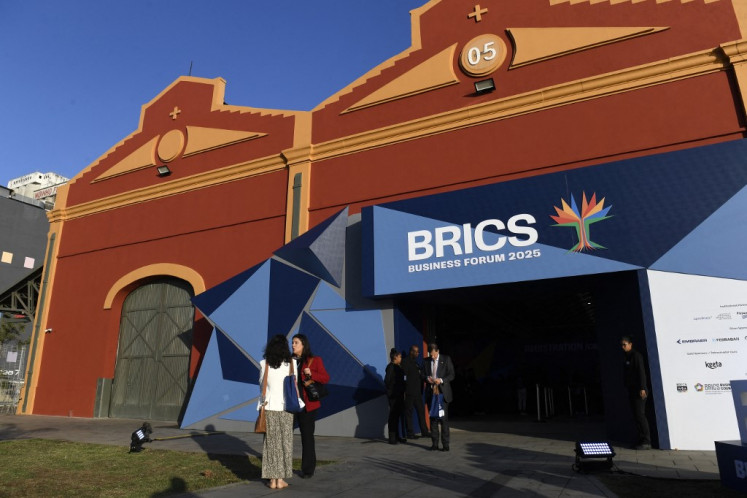Popular Reads
Top Results
Can't find what you're looking for?
View all search resultsPopular Reads
Top Results
Can't find what you're looking for?
View all search resultsNINA VAN TOULON: Eco Flores and the love of an island
JP/Markus Makur I decided to stay in Flores, not literally all the time, but with my heart and spirit
Change text size
Gift Premium Articles
to Anyone
J
span class="caption" style="width: 339px;">JP/Markus Makur I decided to stay in Flores, not literally all the time, but with my heart and spirit. I hoped that I could find a place where my two daughters and I could live, spending time in a useful way, supporting sustainability,” said Nina van Toulon.
The 56-year-old van Toulon came to Flores Island for the first time in 2010 and fell in love with the land and the people she met right away.
Van Toulon, who was born in the Netherlands, found a property in Waecicu, an area of exceptional beauty, home to sea turtles, reef sharks, coral, dolphins and other sea life in West Manggarai.
A year later she was informed about a new development in Waecicu Bay operating jet skis. The idea of jet skis racing in that area was shocking.
A group of landowners and diving operators, both local and foreigners, signed a petition for the regent, to ask his support for legislation to protect Waecicu.
The idea started to pull in everyone from Waecicu and Binongko, working together in a community project for the environment, setting up set up a locally managed marine reserve.
Van Toulon got in touch with Michael Gullbeaux of the Locally Managed Marine Areas (LMMA) network. The LMMA Network is a group of people involved in community-based marine conservation projects around the world, but mostly in the Indo-Pacific. They joined together to learn how to improve their management efforts. Through this contact over the past year, with Gullbeaux’s guidance and support, Eco Flores was born.
Eco Flores coordinates between local people and organizations elsewhere. Local people say what they need and, through LMMA people with solutions get in touch.
Eco Flores is all about sharing, supporting and creating transparency and insight. It is about connecting people and offering information for all to use wherever they need it. It is about giving: about sharing experience and expertise for the benefit of others.
Eco Flores brings together individuals and organizations — NGOs and businesses — and inevitably, the government: indeed, all concerned parties who care about a sustainable future for Flores.
The world of the NGO was new to van Toulon, who worked for 10 years at the university hospital in Leiden as an enterostomal therapist, helping to establish an enterostomal clinic in the hospital. She moved to Hong Kong in 1987 where she lived for 10 years. In Hong Kong, she started an international trading company exporting from China and Indonesia which, with her business partner Katy, she has been running for almost 20 years.
In 1994, when they had a small factory in Ningbo, Zheijiang Province, van Toulon took an interest in the local state run orphanage, far outside the city of Ningbo. Most of the children in this orphanage were born with a disability and the people taking care of them had received no proper training. They were underfunded and had inadequate medical supplies.
Van Toulon began visiting the orphanage every month, bringing supplies the matron requested. To create the kind of environment that all children deserve, staff training and proper sanitation were absolutely necessary. But the orphanage had no hot water, open latrines, and no rehab equipment.
Van Toulon did not have any of the skills needed to make these changes, but she soon began to find others who did. She found out which governmental department to contact to renovate the building, and where to find training for staff, but was quickly disillusioned. The organizations she found were not open to sharing. They worked in a solitary fashion and were highly territorial.
As a newcomer to the NGO world, it was quite shocking and she did not understand the mentality.
“I proposed that the people and organizations I encountered set up a network. Nobody was interested. I had to reinvent the wheel over and over again. This was a waste of precious funds and time, but taught me many things,” she told The Jakarta Post at Eco Flores Conference, in Labuan Bajo, recently.
“Flores Island won my heart in 2010. My first evening in Labuan Bajo city, I met Stefan Rafael, also known as Papa Djoe. We spent all evening talking about his mission: setting up bank sampah [recycling center]. He told me many stories and I asked him if he needed help and if so, what kind.”
“He needed better public relations, so I agreed and began helping find useful contacts to support him. I set up a website and added bits and pieces of information about similar initiatives elsewhere in the world, to help “connect” Papa Djoe to people working on similar projects.”
Flores Island, being one of the less development areas in Indonesia, needs support. There are outside organization and individuals who want to give it support. “Being a foreigner myself, I try to learn more about local people every day and ‘respect’ is my motto.”










